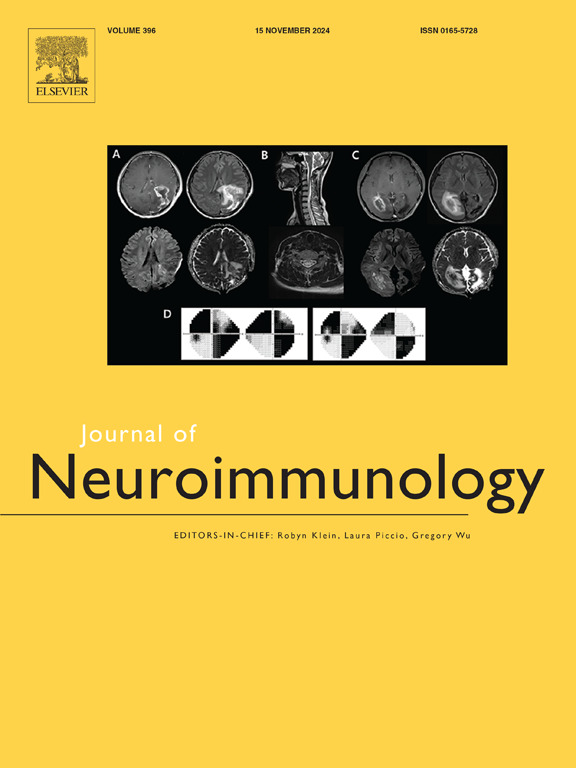Next-generation approaches in autoimmune encephalitis diagnosis: A multi-omics perspective
IF 2.5
4区 医学
Q3 IMMUNOLOGY
引用次数: 0
Abstract
Autoimmune encephalitis (AE) is a group of autoantibody-mediated inflammatory disorders of the central nervous system (CNS) that often present with cognitive deficits, behavioral abnormalities, and seizures. The subtypical variability of AE calls for individualized treatments based on specific antibodies and clinical manifestations. Early and accurate diagnosis and standardized treatment are essential to improve prognosis and promote neurological recovery. Currently, clinical diagnosis of AE relies on the detection of specific antibodies in serum and cerebrospinal fluid (CSF). However, there is usually a delay in this approach, leading to late initiation of treatment, which may result in patients' disease progression yet still not effectively treated. For example, for some specific subtypes of AE, existing antibody tests may not capture all potential markers in time, making early diagnosis and subtyping challenging. In addition, certain AE patients have low antibody levels that make it difficult to confirm the diagnosis with conventional assays, resulting in a delayed diagnosis. Therefore, there is an urgent need for new methods to improve the efficiency of differential diagnosis based on the sensitivity, specificity, or accessibility issues faced by antibody-based diagnosis.
With the help of multi-omics technologies, potential biomarkers of AE can be identified through genomic, proteomic, and metabolomic analyses, leading to improved diagnosis. Multi-omics technologies have demonstrated great potential in the diagnosis and treatment of AE, especially in revealing new markers and improving early diagnosis, but the limitations of technological complexity high cost, and the problem of clinical applicability still need to be overcome. In the future, with technological advances and cost reductions, multi-omics approaches are expected to become an important tool for the early diagnosis of AE and promote more accurate and timely treatment.
自身免疫性脑炎诊断的新一代方法:多组学视角
自身免疫性脑炎(AE)是一组自身抗体介导的中枢神经系统(CNS)炎症性疾病,通常表现为认知缺陷、行为异常和癫痫发作。AE的亚型可变性要求基于特异性抗体和临床表现进行个体化治疗。早期准确诊断和规范治疗对改善预后和促进神经系统恢复至关重要。目前,AE的临床诊断依赖于血清和脑脊液中特异性抗体的检测。然而,这种方法通常存在延迟,导致治疗开始较晚,这可能导致患者疾病进展但仍未得到有效治疗。例如,对于某些特定的AE亚型,现有的抗体检测可能无法及时捕获所有潜在的标记物,这使得早期诊断和分型具有挑战性。此外,某些AE患者的抗体水平较低,难以用常规检测方法确诊,导致诊断延迟。因此,迫切需要新的方法来提高基于抗体诊断所面临的敏感性、特异性或可及性问题的鉴别诊断效率。在多组学技术的帮助下,通过基因组学、蛋白质组学和代谢组学分析可以识别AE的潜在生物标志物,从而提高诊断水平。多组学技术在AE的诊断和治疗中显示出巨大的潜力,特别是在揭示新的标志物和提高早期诊断方面,但技术复杂性、成本高和临床适用性问题仍有待克服。未来,随着技术的进步和成本的降低,多组学方法有望成为AE早期诊断的重要工具,促进更准确、及时的治疗。
本文章由计算机程序翻译,如有差异,请以英文原文为准。
求助全文
约1分钟内获得全文
求助全文
来源期刊

Journal of neuroimmunology
医学-免疫学
CiteScore
6.10
自引率
3.00%
发文量
154
审稿时长
37 days
期刊介绍:
The Journal of Neuroimmunology affords a forum for the publication of works applying immunologic methodology to the furtherance of the neurological sciences. Studies on all branches of the neurosciences, particularly fundamental and applied neurobiology, neurology, neuropathology, neurochemistry, neurovirology, neuroendocrinology, neuromuscular research, neuropharmacology and psychology, which involve either immunologic methodology (e.g. immunocytochemistry) or fundamental immunology (e.g. antibody and lymphocyte assays), are considered for publication.
 求助内容:
求助内容: 应助结果提醒方式:
应助结果提醒方式:


